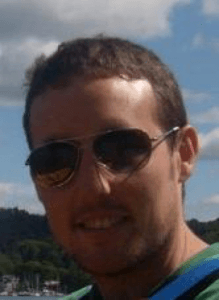One of our Careers Consultants recently interviewed two candidates currently on the NHS Scientist Training Programme. We’ll be sharing these interviews this week and next to help inform you about the value and opportunities available in the programme, and give you real-world insight into the experiences of current candidates. This week we’re sharing our interview with Aled Jones, while a finalist in the Bioinformatics stream. Check in next week for our write-up with Heidi Kuoppama, during her first year on the Genetics Stream.
Applications for the NHS Scientist Training Programme have just opened. Find more information and apply here.

Aled Jones has a degree in Human Biology from Loughborough University and is now entering the final year of the three-year Bioinformatics (Genomics) NHS Scientist Training Program, during which he has been based in the Genetics department of Viapath at Guy’s hospital London.
How did you decide to apply for the bioinformatics STP?
I first became interested in Genetics during my undergraduate degree in Human Biology, so after graduating I took a job in forensics and saved money to fund an MSc in Medical Genetics at Newcastle University. It was here that I was introduced to clinical genetics in the NHS, the role of a Clinical Scientist and the scientist training program (STP) and realised that was a path I wanted to follow.
I applied for the genetics training scheme but I didn’t get onto it. The feedback that I got was that the competition was very stiff, and successful applicants had PhDs or previous NHS lab experience. To increase my chances I got a job as a technologist in the Cytogenetics department at St Mary’s hospital,Manchester.
I was there for four years. I had intended for this job to be short term, a foot-in-the-door of the genetics scientist training program. I enjoyed being in the lab environment, so much so I started to realise the role of a genetics clinical scientist wasn’t for me. I loved the labwork, being busy, and the trouble-shooting elements but I didn’t enjoy analysing and interpreting the results of the genetic tests. That was only a small part of a technologist’s role, but it would be a much bigger part of the genetics clinical scientist role. It was great to find this out in advance but it also meant that the goal I’d been aiming for had vanished.
At around that time next-generation sequencing was starting to be adopted in the clinical service, and this posed lots of challenges in terms of the wealth of data produced. There were many talks which said there was a huge shortage of bioinformatics expertise within the NHS. I was very comfortable on a computer and realised there may be an opportunity here, so I spent my lunchbreaks teaching myself about different aspects of bioinformatics, and learning the Perl programming language on the advice of the department’s Bioinformatician. I really enjoyed this and was looking for ways to move into it more when the NHS announced the bioinformatics STP, which suited my experience and aspirations perfectly. I applied for the first intake and I think that because I had NHS experience, showed that I had researched, investigated and “tried” bioinformatics, I had a good understanding of the training program and discussed bioinformatics in the NHS with colleagues from my lab, I was accepted onto the programme.
What was the STP application process like?
The basic requirement is a 2.2 degree, but it’s a really competitive program. Nearly everyone in my year’s bioinformatics intake has either a PhD or previous experience working within an NHS lab. It is possible to get a place straight out of an undergraduate degree (there’s one person in my year who did) with little or no lab experience, but you’d have to put in a very good application, and show you understand bioinformatics, clinical science, and the NHS.
In the application form there are five questions to answer in quite a short space, so you have to be concise and to the point, and show evidence of your skills and motivation from your real-life examples.
There’s an aptitude test after the application form is submitted. If you don’t pass the test, no one will look at your form. The test is pretty daunting so it’s worth using the practise tests provided as much as possible. However, I didn’t feel I did particularly well on the test, and I got through!
The interview’s a bit like speed-dating. There are four ‘stations’, each lasting 10 minutes, where you are asked really prescriptive questions. Two of the stations were speciality-specific, one computer science based and genetic based which included interpreting the output of a genetic test, so my background in NHS labs was really useful.
What’s good about the job?
Working for the NHS may not offer the biggest salary, but I feel I’m doing something that really matters, ‘giving back’. With the STP you get paid a decent wage to get on-the-job training and a Masters degree. You learn a lot of really useful things during the training programme, and especially with bioinformatics, these skills open up a lot of doors, within and outside of the NHS.
I’m still training so I’m not the most useful person around the lab yet, but when I’ve had the opportunity to work on real bioinformatics projects that are useful to people in the lab, I’ve found it really absorbing and rewarding.
What are the challenges/downsides?
A lot of the challenges my intake to the program has encountered are to do with the fact that bioinformatics is so new, and we’re the first year of the bioinformatics STP, so we’ve been guinea pigs in a way. I think subsequent intakes will experience fewer of those issues.
But there are some more general challenges too. The way the programme works is there are separate modules, and each of these have competencies that you have to tick off in various ways, maybe through writing a report or giving a presentation, and sometimes these can seem a little disjointed. Personally, I’m better at getting stuck into one bigger piece of work, so balancing all these little projects can be tough at times.
Another thing I’ve found difficult is the switch to a fairly solitary desk-job. When I was a technologist I was in the lab, physically moving around and had built up responsibilities so I was in demand and often asked for advice, but now I sit at a desk all day and have little reason to interact with the rest of the lab, especially as at the moment I’m training.
And another possible downside is the way that the STP positions are allocated. STP vacancies come up across the UK, and depending on how you perform in the interview, you may end up being offered a position somewhere in the country you don’t particularly want to work. This is what happened to me. I was very happy living and working in Manchester, my friends and girlfriend were there, but I ended up with an STP offer in London, which was not one of my top choices. Guy’s has a great genetics department, one of, if not the best, in the UK, and so in hindsight it was a good thing, but the move was pretty disruptive to my and my girlfriend’s lives. I know people have turned down offers because they were placed somewhere they didn’t want to move to. Although there is no guarantee you’ll get your choices I’d recommend researching the labs which you apply to.
What’s the progression like?
When I complete the program I’ll be state-registered as a clinical scientist. However, there’s no guarantee of a job, so I’ll have to apply for any clinical scientist vacancies that arise. I’m an optimist, so I think if a department has spent three years training a person in an area where there’s a skills shortage, they should be ideally suited for a job in that department. But whether departments will have the money to fund a post is a different story (trainees are funded centrally, not by the host lab and money is quite tight in many departments/in the NHS!!).
I’m confident I’ll find a job in clinical bioinformatics though as if I cannot find a role in a genetics department, I think there will be bioinformatics positions popping up in virology and microbiology departments as they too adopt next generation sequencing and encounter the same challenges genetics faced.
Also, with bioinformatics in particular, I’ll come out of the program with a whole host of new computing skills that I didn’t have before, and they’ll be valuable to a variety of employers, not just the NHS.
What are your top tips for anyone interested in the STP?
Take every opportunity to find out about the STP and the work of clinical scientists [reading this blog post counts!]. Lots of labs have open days, and representatives from the STP visit universities. If you’ve missed all of that, try contacting your local department and asking a few questions. This will help you to understand the programme, and to show your motivation.
Applications for the NHS Scientist Training Programme have just opened. Find more information and apply here.
Check in next week for our write-up with Heidi Kuoppama, during her first year on the Genetics Stream.
 Close
Close




